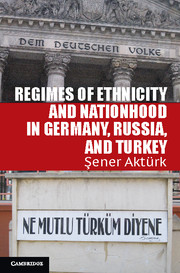Book contents
- Frontmatter
- Contents
- List of Tables, Figures, Graphs, and Maps
- List of Abbreviations
- Acknowledgments
- Part I Theoretical Framework and Empirical Overview
- Part II Germany
- Part III Turkey
- Part IV Soviet Union and The Russian Federation
- Part V Conclusion
- 8 Dynamics of Persistence and Change in Ethnicity Regimes
- Bibliography
- Index
- References
8 - Dynamics of Persistence and Change in Ethnicity Regimes
Published online by Cambridge University Press: 18 December 2014
- Frontmatter
- Contents
- List of Tables, Figures, Graphs, and Maps
- List of Abbreviations
- Acknowledgments
- Part I Theoretical Framework and Empirical Overview
- Part II Germany
- Part III Turkey
- Part IV Soviet Union and The Russian Federation
- Part V Conclusion
- 8 Dynamics of Persistence and Change in Ethnicity Regimes
- Bibliography
- Index
- References
Summary
I tried to answer fundamental questions of ethnic politics and nation building in this book: Why do state policies toward ethnicity change over time? What are the determinants of change and continuity? In order to do this, I first put forward a tripartite typology of ethnicity regimes around the world (monoethnic, multiethnic, and antiethnic regimes), which I defined along axes of membership and expression, manifest in various state policies toward ethnic diversity. I believe this typology to be superior to other classifications used in studies of ethnicity and nationalism.
In explaining ethnic regime change, my chief finding is that state policies toward ethnicity change if three conditions are met: if counterelites representing constituencies with ethnically specific grievances assume political power, armed with a new discourse on ethnicity and nationhood, and garner a hegemonic majority against the defenders of the status quo, then state policies toward ethnicity can be changed. These three elements are separately necessary and together sufficient for change. This configuration of independent variables encompasses actors’ incentives, ideas, and constraints central to political processes regarding ethnicity.
However, the coincidence of these three elements necessary for change in state policies toward ethnicity was extremely rare in the last six decades in the political history of Germany, the Soviet Union, post-Soviet Russia, and Turkey.
- Type
- Chapter
- Information
- Publisher: Cambridge University PressPrint publication year: 2012



